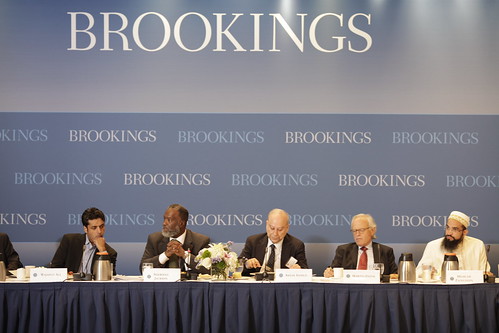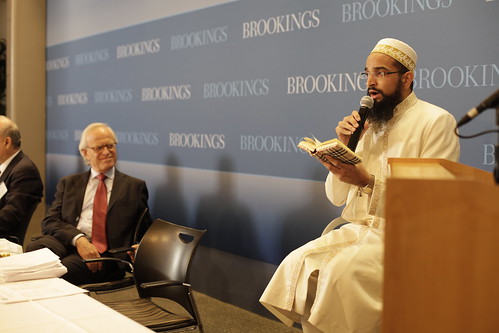This is a guest post by Durriya Badani.
On August 9, 2011, the Project on U.S. Relations with the Islamic World hosted the Brookings Institution’s first Iftar dinner. The Iftar dinner, has been an annual tradition in Washington, D.C. since 2000, with Iftars being celebrated at the White House, the U.S. Department of State, the U.S. Department of Commerce, and U.S. embassies overseas. The event was an intimate conversation among colleagues and members of the American Muslim community, and featured noted academics, playwrights, former ambassadors, government officials, religious leaders, and community activists. Mehlam bin Ali Asghar Zainuddin, a member of the Dawoodi Bohra community and grandson of His Holiness Syedna Mohammed Burhanuddin TUS, delivered the Qur’anic recitation and commentary, selecting passages from Surat al Hashr and Surat al Hijr and discussed the importance of piety and the remembrance of Allah during the month of Ramadan. He shared with both the literal and the deeper meanings of the passages, noting that although the pious will certainly be amidst the gardens and the heavens in the afterlife, even for this time, if they are indeed pious they are already amidst the gardens and rivers of Jannat even in this world. He further spoke of the importance of rememberance of Allah, of tasbeeh, and shared a brief verse from the Arabic poet Muttanabi.
The panel discussion that followed highlighted the increased involvement, activism, and engagement of the younger American Muslim generation, a “9/11 generation,” as President Obama recently coined. This is a generation that has expressed and raised its voice and articulated its story in a variety of ways—as playwrights, writers, filmmakers, and poets. One of the panel speakers noted that this moment in American Muslim history heralds back to the early days of Islam, since in 7th century Arabia, it was the storyteller, not the swordsman, who was the most valued and prized member of society. One of the participants commented on the administration’s efforts to deepen and broaden the relationship with Muslim communities, which has encompassed looking beyond the security relationship to explore other dimensions, including but not limited to arts and culture and science and technology. In addition, other participants mentioned the difference in experiences between Muslims in the United States and those in Europe. Others suggested that lessons can be drawn from other communities which have experienced similar challenges in being accepted and integrated into mainstream American society. One of the panelists reaffirmed this point, noting that the experiences of the African American community are valuable and instructive. Finally, a few participants reflected on the progress made by the American Muslim community in the last decade, both culturally and politically. In regard to the latter, these participants pointed to the election of two Muslim American members of Congress, the grassroots activities and appointment of Muslim Americans to high-level cabinet positions in states such as Maryland, and the election of a president with a Muslim middle name of Hussein.
Additional photographs and information are available at the US – Islamic World Forum website (islamicworldforum.org) and you can follow them on Twitter as @usislamicforum.
Durriya Badani is the Deputy Director of the Brookings Project on U.S. Relations with the Islamic World at the Saban Center for Middle East Policy.


